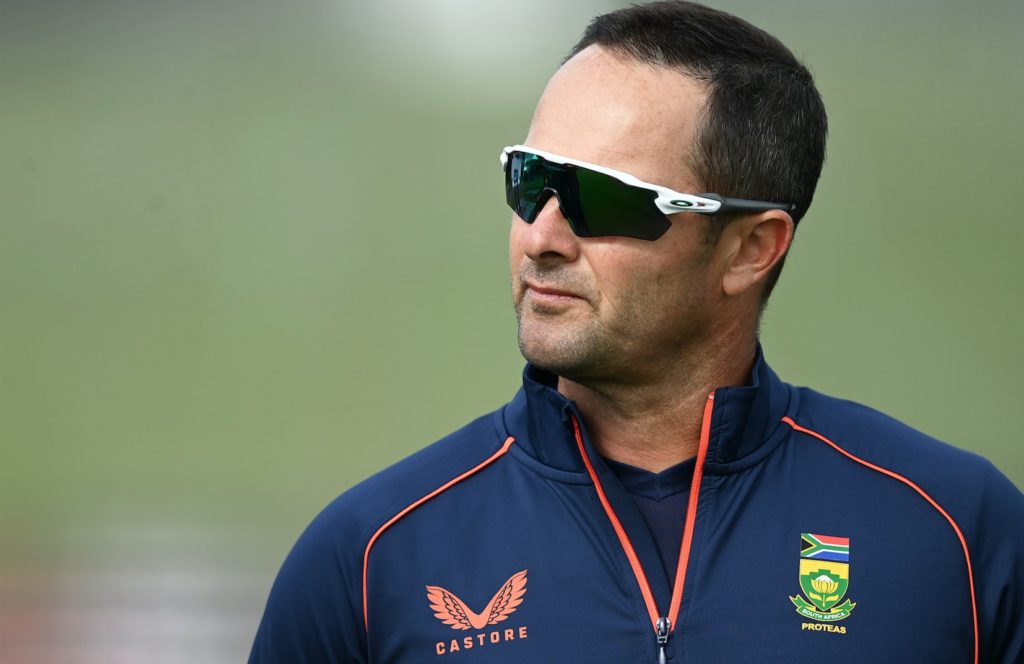Cricket South Africa says former Proteas skipper Faf du Plessis’ allegations of a dysfunctional professional relationship with coach Mark Boucher are “personal” and refused to comment on them.
Extracts from Du Plessis’ book, ‘Faf: Through Fire’, paint the picture of a broken professional relationship between the coach and former skipper.
READ: Boucher extinguished my Proteas fire – Faf
Du Plessis was a prolific, three-format player when Boucher took over in December 2019. However, Du Plessis says he felt increasingly undervalued, and his experience deepened after retiring from Test cricket.
Du Plessis, who hasn’t played international white-ball cricket since 2019 despite being elite in both formats and carrying his T20 form through to the IPL and other global franchise competitions, intimates that his icy relationship with Boucher effectively ended his international career.
The Proteas have excluded him from two T20 World Cup squads, despite him being one of the format’s preeminent openers, and having a history of batting at No 3 (he averages 37.25 at a strike rate of 135.41) and No 4 (he averages 31.85 at a strike rate of 135.15).
It is hard to build a cricket argument defending his exclusion. CSA convenor of selectors, Victor Mpitsang, has previously explained: “We have a very clear policy that outlines the availability of non-contracted players,” referring to a selection document that states that a player who is not nationally contracted “must play for a South African professional team, or be available to play for such a team immediately before for the Proteas”.
In his autobiography, Du Plessis explains that he had a discussion with former director of cricket Graeme Smith about an exception to that rule, and asked for a “formal offer that would enable me to play in fewer leagues”, but that never materialised.
He followed up with an email to Smith, Boucher and Mpitsang, asking for “better two-way communication. I said a breakdown in communication had led to AB not playing in the 2019 World Cup, which became a media mess. I wanted us to prevent a repetition of that. So what did they expect of a player who was not contracted but was in contention for the World Cup?”
He received no response to the email, and says Mpitsang “had not had a single conversation with me since he’d been appointed to replace Linda Zondi in October 2020”.
Early Sunday, SACricketMag.com senior contributor Ryan Vrede emailed CSA asking the body to address the allegations relating to Boucher and Du Plessis’ professional relationship, which appears to have compromised an in-form, world-class player’s international career, as well as for its response to Du Plessis’ short-term contract query that he says was ignored after the initial engagement.
“The context of the query is of a personal nature that only Mark will decide whether or not a statement is warranted,” CSA wrote in response while providing Boucher’s personal email address.
Vrede wrote back: “Boucher is the national team coach, and Du Plessis isn’t speaking about his personal relationship with him. The context is clear and relates to incidents that are rooted in a professional relationship, not a personal one. I’d appreciate if you’d reconsider this stance.”
CSA has not responded. The governing body also completely ignored the question about Du Plessis’ proposed short-term contract.
Boucher’s tenure ends at the conclusion of the T20 World Cup and it appears his current employer has no appetite to defend him on these issues.
CSA expressed surprise when he announced his resignation in September. However, the organisation fractured its relationship with the coach by lodging charges of racism against him after Paul Adams, a former teammate, said at last year’s Social Justice and Nation-Building (SJN) hearings that he had been a victim of racial discrimination during his playing days.
Adams implicated Boucher, explaining that he was part of a group of Proteas teammates who referred to him as “brown s**t” during team meetings.
CSA dropped those charges in May, citing no basis for them.







